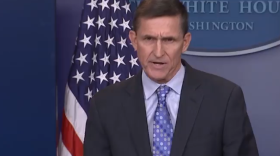From Texas Standard:
President Donald Trump renewed a campaign pledge Thursday to sign a bill that would alter an aspect of the divide between church and state that's been in place since 1954. At a prayer breakfast in Washington, D.C. he said he would “get rid of and totally destroy the Johnson Amendment and allow our representatives of faith to speak freely and without fear of retribution.”
Some conservatives and religious organizations, among them evangelical Protestants which have been at the forefront in pushing for the amendment’s repeal, argue that the Johnson Amendment infringes on the First Amendment’s right to free speech.
Under the amendment, named and sponsored by then-Sen. Lyndon B. Johnson from Texas, tax-exempt entities like churches and charitable organizations may not directly or indirectly participate in any political campaign on behalf of or in opposition to any candidate. Ministers may not use the pulpit to endorse or oppose candidates. If they do, their churches risk losing their tax-exempt status.
When the bill was first passed, it wasn't very controversial. It was approved by a Republican Congress and signed by President Dwight D. Eisenhower, also a Republican.
William Martin, with Rice University's Baker Institute, says Johnson sponsored the bill to dampen the effects of charities and political organizations lobbying against him and in favor of Sen. Joseph McCarthy. Johnson wanted to remove their tax exempt status. The bill included religious organizations, but that addition was the furthest from Johnson’s mind, Martin says.
The amendment doesn’t bar all political speech, however.
"Churches can speak on issues. They can freely campaign for issues,” Martin says. “That's often clear which party they're in favor of. ... They can conduct nonpartisan voter drives. Pastors indeed play the key role in the rise of the religious right. If they stipulate they're not acting in the name of the church, then they can do whatever they like.”
For the past few years more than 2,000 pastors have participated in “Pulpit Freedom Sunday” – a test to the amendment where ministers deliver politically-charged sermons, and in some cases, send the sermons to the IRS.
But according to the Washington Post, the Internal Revenue Service has been lax on investigating churches that don’t abide by the amendment. The IRS has only looked into one instance of a minister using the pulpit for political causes and has yet to punish any religious organization for doing so.
Trump’s proposed removal of the amendment can only happen through a repeal passed by Congress, but Trump could still hold the power keep the law from being enforced.
Martin says Trump is catering to churches who want the amendment repealed, but they have hardly been muzzled from free speech. He says he’s not sure how churches’ claims of intimidation hold up.
"Almost everywhere in the world where people are at war, religion has played a role – and usually a negative one,” Martin says. “In this country, religion contributes to a growing and disturbing polarization. Taking down this already weak barrier would not help.
“In this case, richer churches and denominations – larger ones – would have a government-financed political advantage and that’s what I think we really need to avoid."
Written by Beth Cortez-Neavel.




